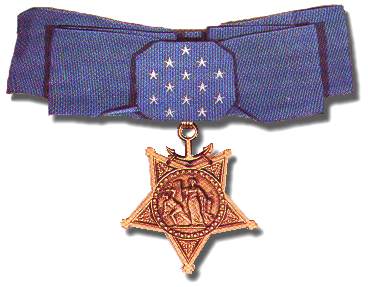Medal of Honor
The Medal of Honor was established by Joint Resolution of Congress, 12 July 1862 (amended by acts 9 July 1918 and 25 July 1963). The Medal of Honor is awarded by the President in the name of Congress to a person who distinguishes himself or herself conspicuously by gallantry and intrepidity at the risk of his life or her life above and beyond the call of duty while engaged in an action against an enemy of the United States; while engaged in military operations involving conflict with an opposing foreign force; or while serving with friendly foreign forces engaged in an armed conflict against an opposing armed force in which the United States is not a belligerent party. The deed performed must have been one of personal bravery or self-sacrifice so conspicuous as to clearly distinguish the individual above his comrades and must have involved risk of life. Incontestable proof of the performance of the service will be exacted and each recommendation for the award of this decoration will be considered on the standard of extraordinary merit.

The medal was originally awarded to petty officers, seamen, landsmen and marines for gallantry in action and other seamanlike qualities (such as the saving of lives). Officers were not eligible until March 3, 1915, but some awards were made retroactive to earlier campaigns. An Act of Congress on August 7, 1942 established the Medal of Honor as a combat award only. It is the highest award for gallantry that the Navy bestows.